Former President Donald Trump and eight other defendants accused of illegally trying to interfere in the 2020 election in Georgia on Friday submitted a formal application to appeal a judge's ruling allowing Fulton County District Attorney Fani Willis to remain on the case.
Trump and other defendants had attempted to have Willis and her office removed from the case, citing her romantic relationship with special prosecutor Nathan Wade as a conflict of interest. Superior Court Judge Scott McAfee recently determined that there was no conflict of interest requiring Willis to step down, but acknowledged that the prosecution was "encumbered by an appearance of impropriety."
McAfee's decision stated that Willis could proceed with the prosecution if Wade withdrew from the case, and the special prosecutor resigned shortly after. Following this development, Trump's legal team and other defendants requested permission from McAfee to appeal his ruling to the Georgia Court of Appeals, which was granted.
The submission of the application to the appeals court marks the next phase in the legal process. The Court of Appeals now has 45 days to determine whether it will review the case.
The scandal surrounding Willis's alleged improper benefits from her relationship with Wade caused a major upheaval in the case. Intimate details of their personal lives were publicly revealed in court in mid-February, overshadowing the serious accusations in one of the four criminal cases against the former Republican president. In August, Trump and 18 others were indicted for their involvement in an extensive scheme to unlawfully overturn his narrow 2020 election loss to President Biden in Georgia.
Steve Sadow, Trump's chief attorney in the case, emphasized that the case should have been dismissed, and at the very least, Willis should have been disqualified from prosecuting it further. Sadow urged the Court of Appeals to accept the application and review the appeal's merits.
A representative for Willis chose not to provide a comment.
Willis utilized Georgia's Racketeer Influenced and Corrupt Organizations (RICO) law, a comprehensive anti-racketeering statute, to charge Trump and the other 18 individuals. Four individuals implicated in the case have pleaded guilty after making deals with the prosecution. Trump and the remaining defendants have pleaded not guilty.
McAfee evidently determined that the relationship between Willis and Wade, along with Wade's role as the lead prosecutor in the case, created an appearance of impropriety. The defense attorneys argued in their application that McAfee's failure to disqualify Willis and her entire office from the case "constitutes a clear legal error that necessitates reversal."
The lawyers representing the defendants in the case have filed an application requesting the disqualification of Prosecutor Willis. They argue that due to the complexity of the case and the number of defendants involved, multiple trials will be necessary. Failing to disqualify Willis now could potentially lead to verdicts being overturned, causing a lengthy and costly process to be repeated. The application emphasizes the importance of efficiency and prudence in avoiding a situation that could be "painful, divisive, and expensive."
Judge McAfee, in his ruling, noted the lack of appellate guidance on disqualifying a prosecutor for forensic misconduct. The defense attorneys are urging the appeals court to intervene and set a precedent in this matter.
Furthermore, the defense team stressed the significance of prosecutors maintaining a sense of impartiality and disinterest to uphold public trust in the judicial system.







